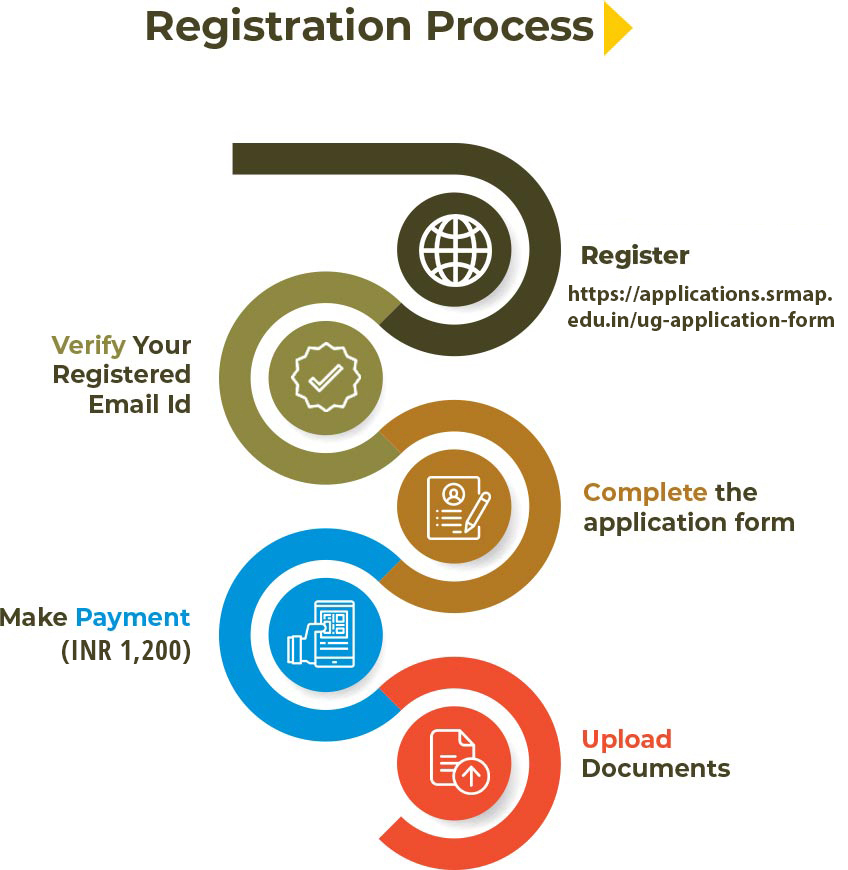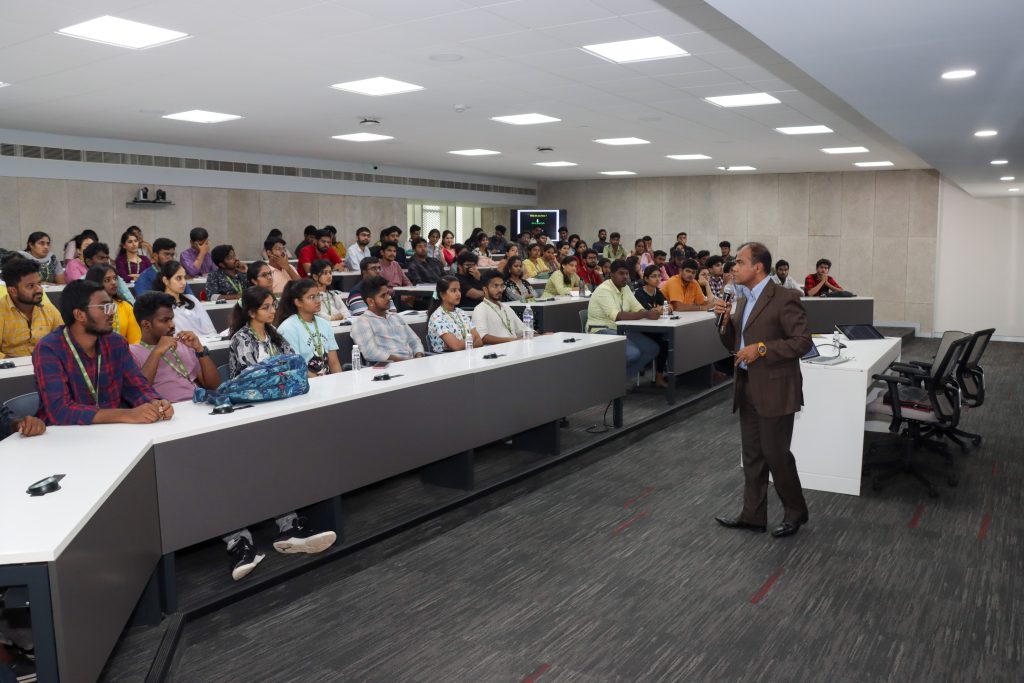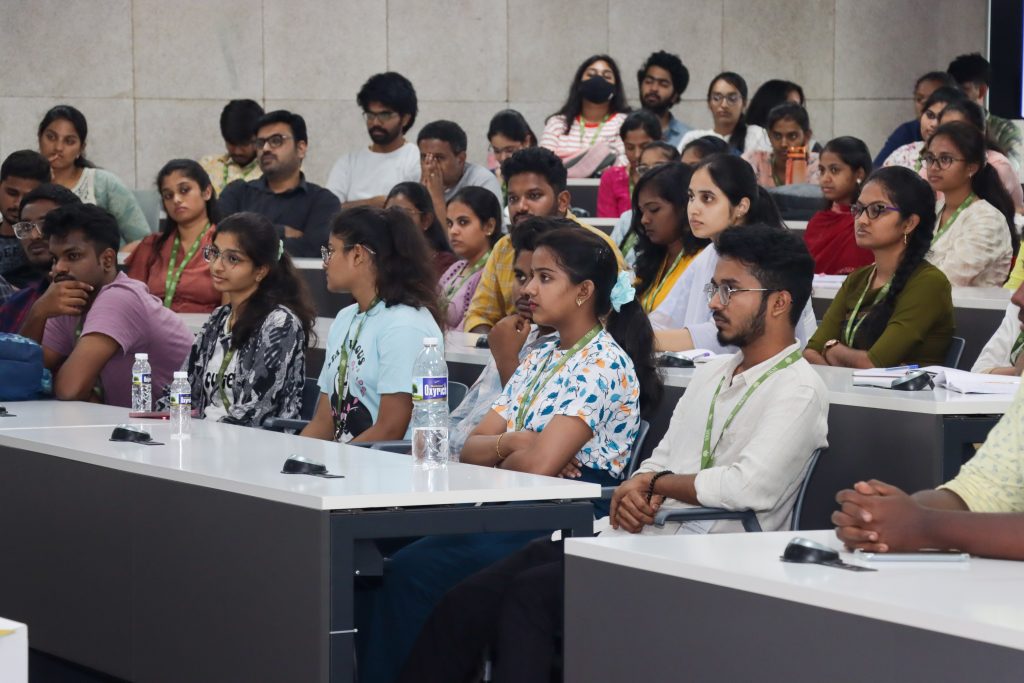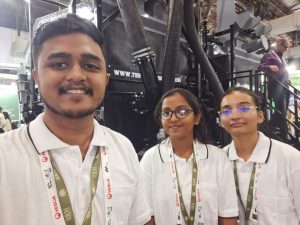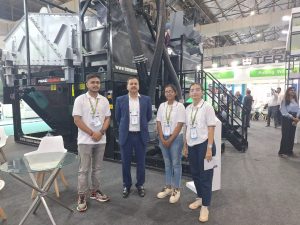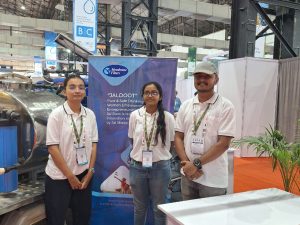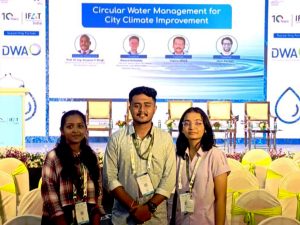All Management Events
- SRMJEEE 2024 : Complete and Latest Information November 22, 2023
BTech – SRMJEEE Application 2024
If you are here, then the chances are that you already know that SRMJEEE 2024 is the Joint Engineering Entrance Examination held by the SRM Institute of Science and Technology. Appearing for SRMJEEE 2024 is a very convenient method to get into one of the finest research institutes in any part of the country.
Through SRMJEEE 2024, you can become a part of SRM University-AP. Innovation and research at SRM University-AP are multidisciplinary and cutting-edge. You can be a part of one of the most advanced classrooms, learn from exclusive field experts from India and abroad, even take up a semester abroad yourself, and much more.
Are you interested in applying? You are just one simple click away from the smoothest application procedure.
Application for Admissions 2024 is Opened!.Want to know more? Don’t worry. We will walk you through the entire process. This is as simple as it gets.
Table of Contents
- SRMJEEE 2024 Important Dates
- SRMJEEE 2024 Admission Process
- SRMJEEE 2024 Examination Question Pattern
- SRMJEEE 2024 Syllabus
- SRMJEEE 2024 Eligibility
- SRMJEEE 2024 Application Process
1. SRMJEEE 2024 Important Dates:
The dates for the two-phase examination procedure of SRMJEEE 2024 have been released.
Entrance Exams for Engineering Programs (SRMJEEE): Number of SRMJEEE Phases – 2 Timeline of SRMJEEE Phases Phase 1* Phase 2* SRMJEEE ( Remote Proctored Online mode ) 20 April 2024 , 21st April 2024, 22nd April 2024 21st June 2024, 22nd June 2024, 23rd June 2024 Application Deadline for Each Phase 13th April 2024 15th June2024 SRMJEEE 2024 Phase-2 Instructions
2. SRMJEEE 2024 Admission Process:

3. SRMJEEE 2024 Examination Question Pattern:
- Each question carries one mark. There are NO negative marks. You are encouraged to attempt every question.
- The mode of examination will be online.
- The question paper type will be MCQs or Multiple Choice Questions only.
- The question paper will be in English ONLY.
- Physics- 35 questions
- Chemistry- 35 questions
- Mathematics/Biology- 40 questions
- Aptitude- 10 questions
- English- 5 questions
- Total number of questions- 125
- Total time: 2.30 hrs
SRMJEEE Sample Papers Download Link SRMJEEE Question Papers 2023 Download Here SRMJEEE Question Papers 2022 Download Here SRMJEEE Question Papers 2019 Download Here SRMJEEE Question Papers 2018 Download Here SRMJEEE Question Papers 2017 Download Here SRMJEEE Question Papers 2015 Download Here 4. SRMJEEE 2024 Syllabus:
5. SRMJEEE 2024 Eligibility:
A. Nationality and Age
- Resident Indian or Non-Resident Indian (NRI), holder of PIO or OCI card issued by the Government of India are eligible to apply for SRMJEEE (UG).
Note: NRIs, holders of PIO or OCI card issued by the Government of India who has not taken the SRMJEEE (UG), must apply under the international student category only. - Students should have attained the age of 16 years and 6 months on the 31st of July of the calendar year in which the 12th Board examination is to be held.
B. Eligibility to apply for the Qualifying Examination:
- A minimum aggregate score of 60% or equivalent grade point in Class X.
- Passed with Minimum 60% aggregate or equivalent grade in Physics, Mathematics, and Chemistry/ Computer Science/ Information Technology/ Informatics Practices/ Engineering Graphics in 12th Standard/Higher secondary examination (10+2 pattern ) /Intermediate (first and second year) or appearing in 12th Standard/Higher Secondary examination(10+2 pattern)/Intermediate in the current academic year with Physics and Mathematics as compulsory subjects along with any one of the subjects, Chemistry/ Computer Science/ Information Technology/ Informatics Practices/ Engineering Graphics as major subjects in regular stream from any state board within India, CBSE, ISCE, Matriculation, or NIOS are eligible to apply. However, admission is confirmed based on meeting the minimum 60% aggregate or equivalent grade in Physics, Mathematics, and Chemistry/ Computer Science/ Information Technology/ Informatics Practices/ Engineering Graphics in 12th Standard/Higher secondary examination (10+2 pattern) /Intermediate (first and second year).
- GCE A-Level: Minimum C grade in Physics and Mathematics and Chemistry/ Computer Science/ Information Technology/ Informatics Practices/ Engineering Graphics. Physics and Mathematics should be compulsory subjects along with one of the Chemistry/ Computer Science/ Information Technology/ Informatics Practices/ Engineering Graphics as major subjects (equivalent to Advanced Placement level in each subject) in any international schools within India.
- International Baccalaureate (IB) diploma or IB certificate: Minimum 4 points each in Physics and Mathematics and Chemistry/ Computer Science/ Information Technology/ Informatics Practices/ Engineering Graphics.
- 2 subjects in HL (equivalent to Advanced Placement level or Honors) and 1 subject in SL is mandatory.
Programme HL SL/HL All BTech Programmes Maths Physics and Chemistry / Computer Science/ Information Technology/ Informatics Practices/ Engineering Graphics Note:
- If Computer Science/ Information Technology/ Informatics Practices are considered for eligibility, then the candidate will be eligible only for BTech CSE and specialisations in Computer Science.
- For all other programmes (ECE, EEE, Mechanical Engineering, and Civil Engineering), Chemistry will be taken for eligibility.
- Students who have completed +2/Intermediate/equivalent under NIOS must have completed the 10th standard/equivalent from regular schooling or vice-versa.
- For the Board of Intermediate Education (Andhra Pradesh) Average of first and second-year marks is considered.
C. Criteria for Admission
Indian students
- Admission will be based on meeting the eligibility conditions listed in Section A and Section B and the performance in the qualifying examination i.e., SRM JEEE / SRMAPET.
- The decision of the admission committee will be final and binding.
D. Admission Instructions
Continue reading →- BTech programmes listed on the website are indicative only. SRM University-AP reserves the right to add and delete programmes and amend the list depending on the viability of offering the same.
- The admission will be purely on the basis of the performance in the SRMJEEE (UG)/SRMAPET entrance examination conducted by SRM University-AP. Being called for the entrance test and enrolment does not necessarily mean accepting eligibility. It is the responsibility of the candidates to ascertain whether they possess the requisite eligibility for admission.
- Eligibility criteria such as the minimum percentage of marks in PCM or CGPA obtained by the candidate in the qualifying examination and minimum percentage in the 10th standard shall be as prescribed by the SRM University-AP from time to time.
Note: The aggregate percentage of marks obtained in the 10th Standard/ PCM in 12th Standard/Intermediate/equivalent should be calculated up to 3 decimal points and not be rounded off to the nearest integer. - Academic tuition fees, hostel fees, mode of payment, and refund policies will be available on the university website.
- The admission offered to a candidate who has been provisionally admitted to a programme will stand cancelled if he/she does not submit the relevant documents pertaining to admission (such as Marks Statements, Transfer Certificate, Conduct Certificate, etc.) in their original during enrolment before the date stipulated by the university.
- Even after admission, the university reserves all rights to cancel the candidate’s admission in case, any discrepancy is noticed on verification of facts from the original certificates/documents. The decision shall be final and binding on the candidate. The university cannot be held responsible for any loss or damage arising from such cancellations of admissions.
- Accommodation in SRM University-AP hostels will be subject to availability. The allocation will only be done after the tuition fee payment and enrolment procedure are completed.
- All disputes are subject to the jurisdiction of the courts only at Vijayawada.
- Refund Policy: Candidates are requested to visit the SRM University-AP website for the detailed refund policy, timeline and eligibility percentage of tuition fee.
- Diwali Celebrations November 21, 2023
Andhra Patrika
Continue reading →
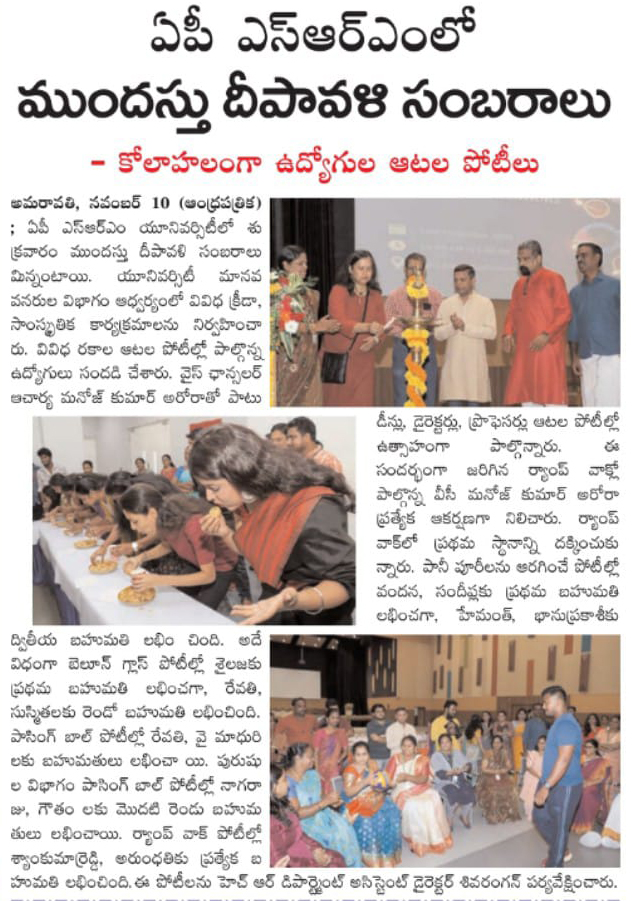
- 7th Research Day Celebrations November 20, 2023
The Hans India
Continue reading →
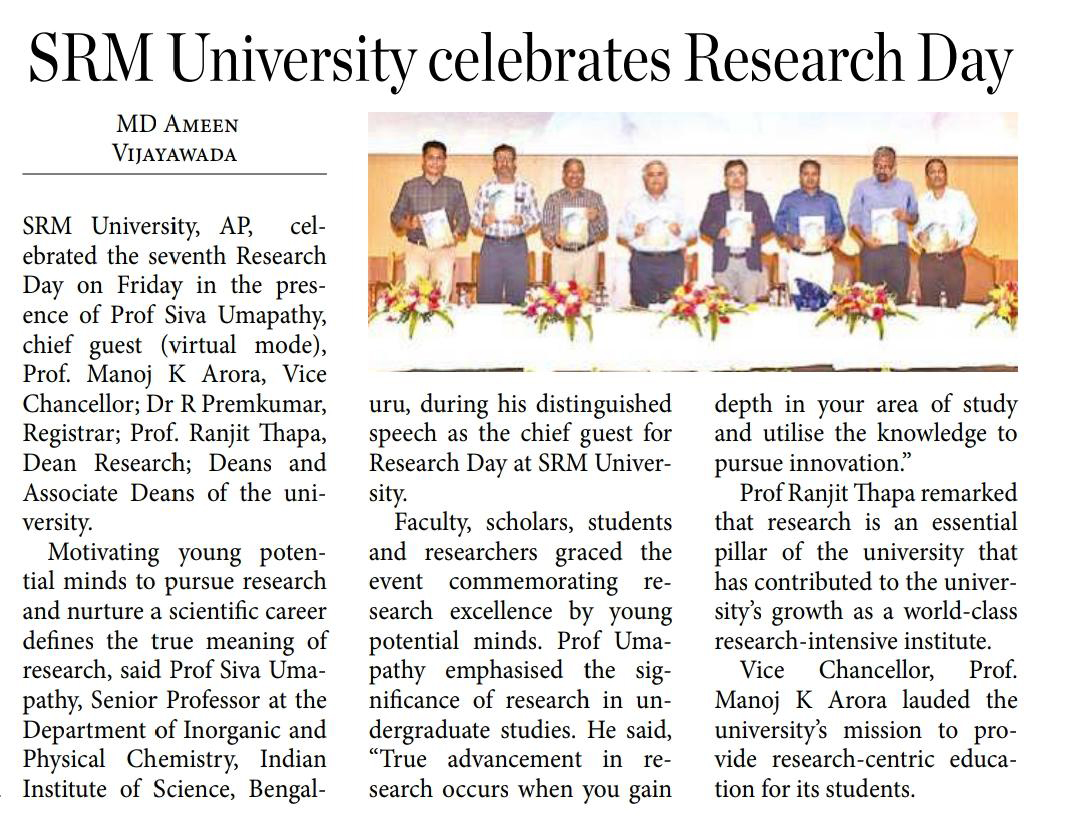
The Pioneer
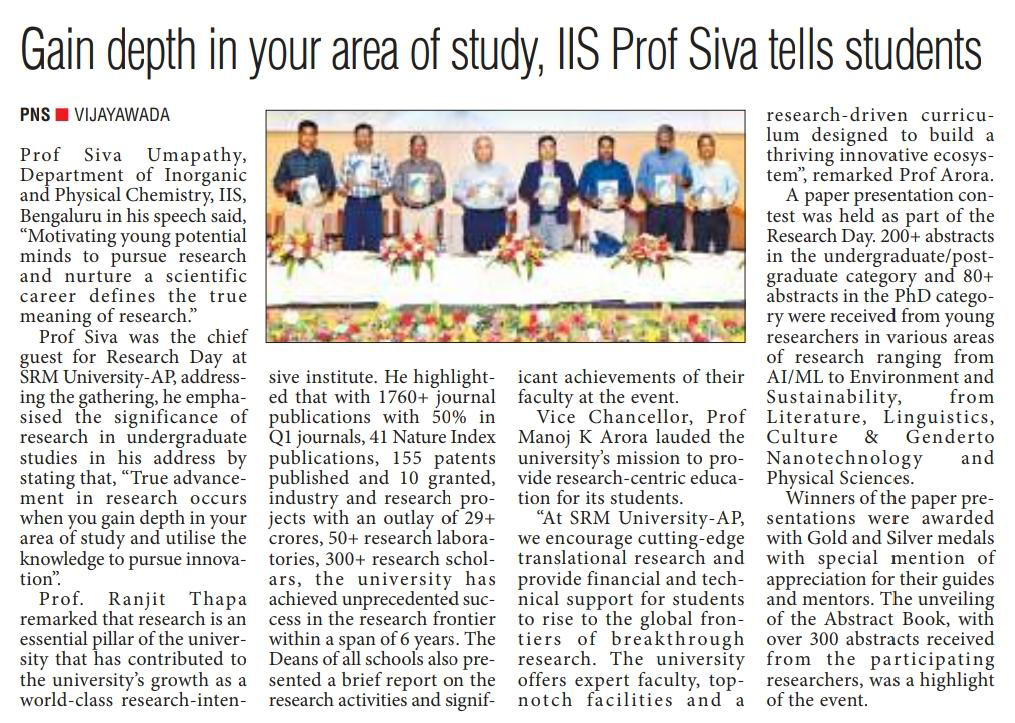
The New Indian Express
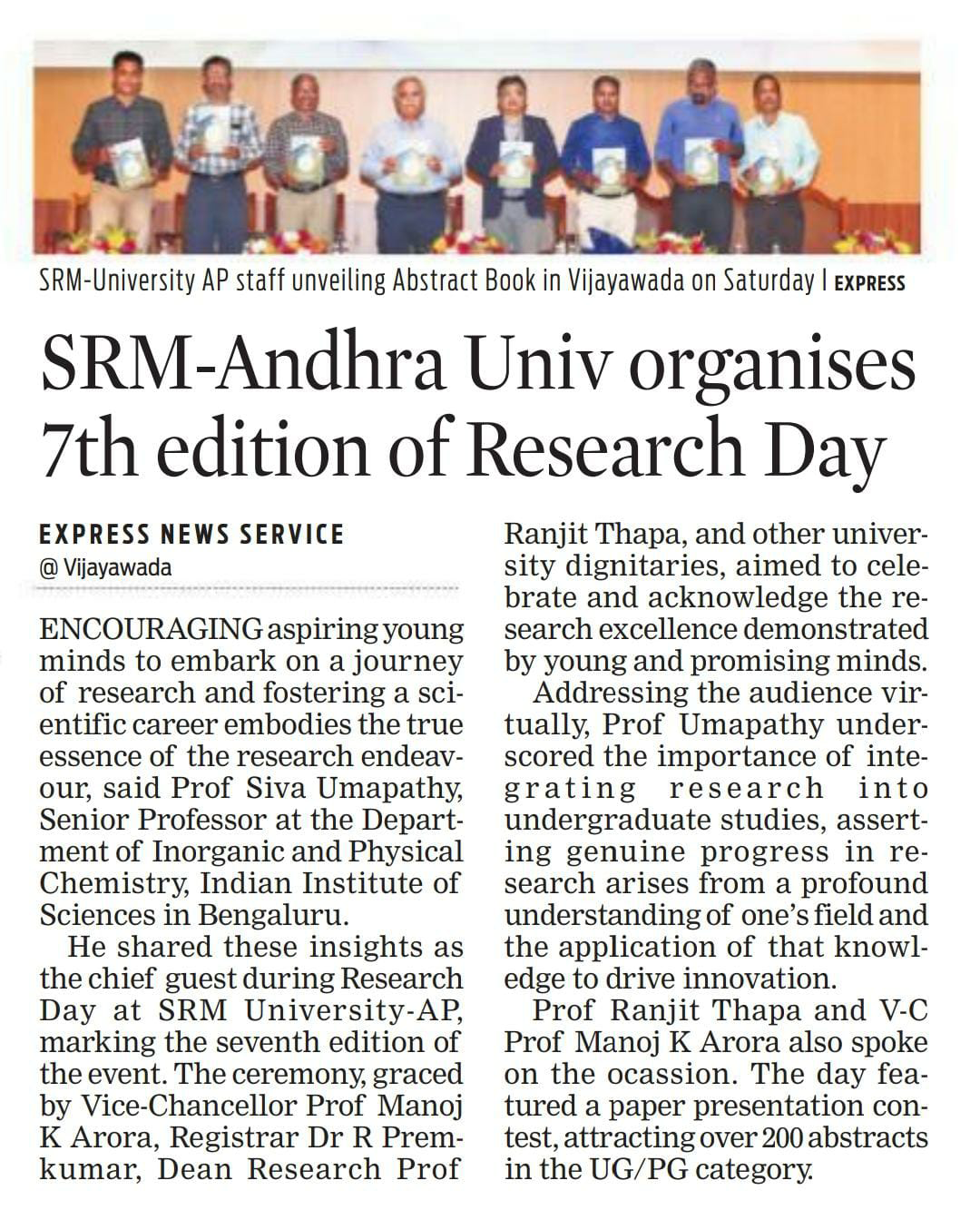
The Newsvoir
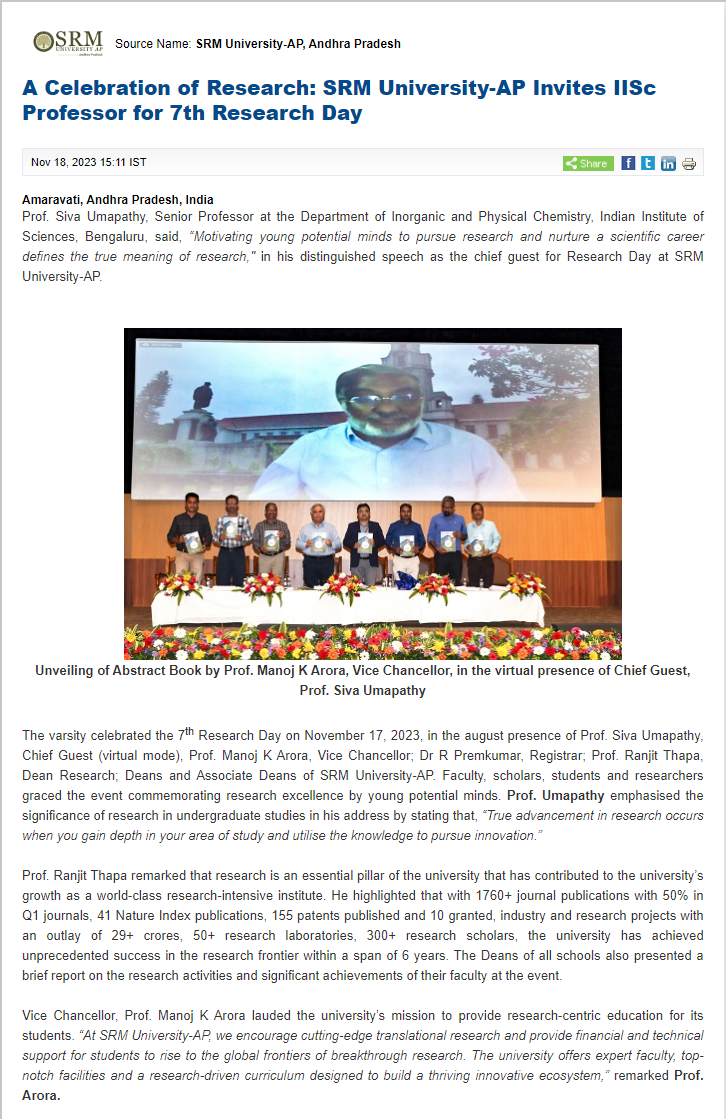
Vartha Prapancham
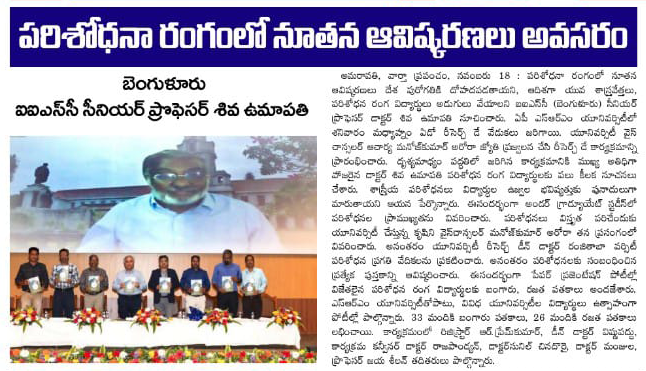
Andhra Patrika
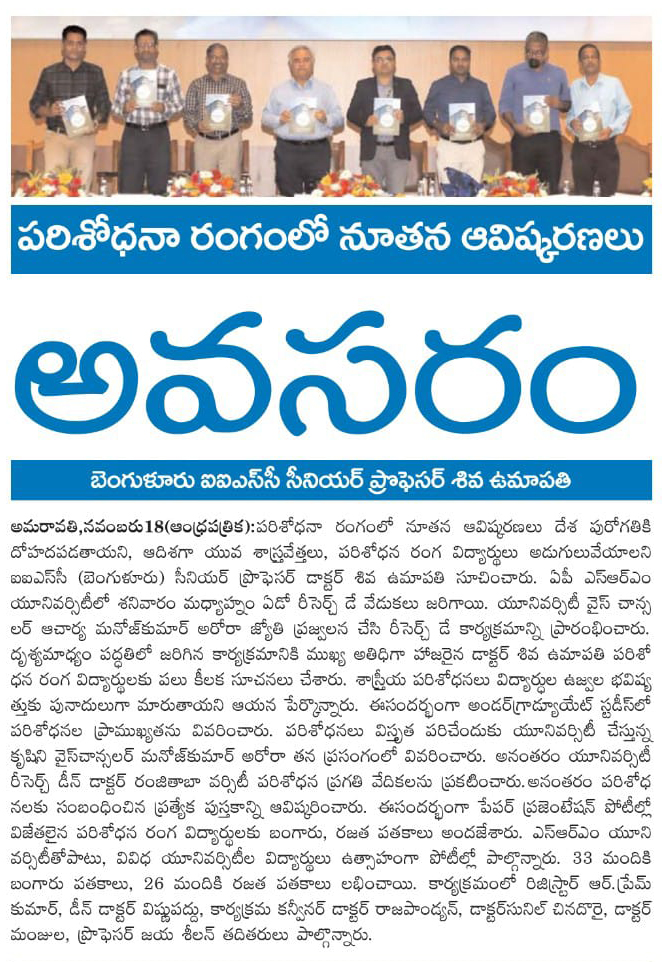
Praja Sakthi
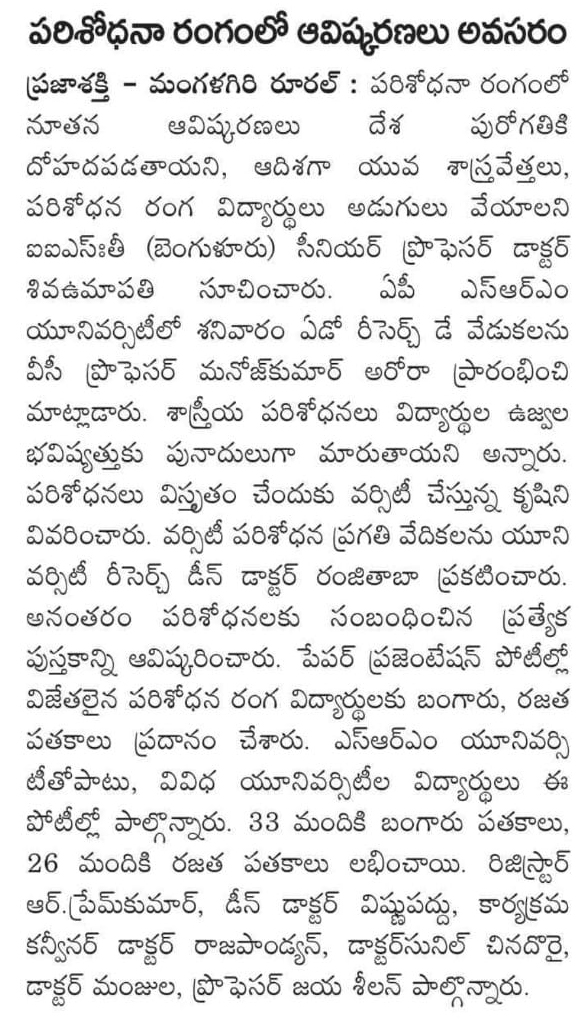
Surya
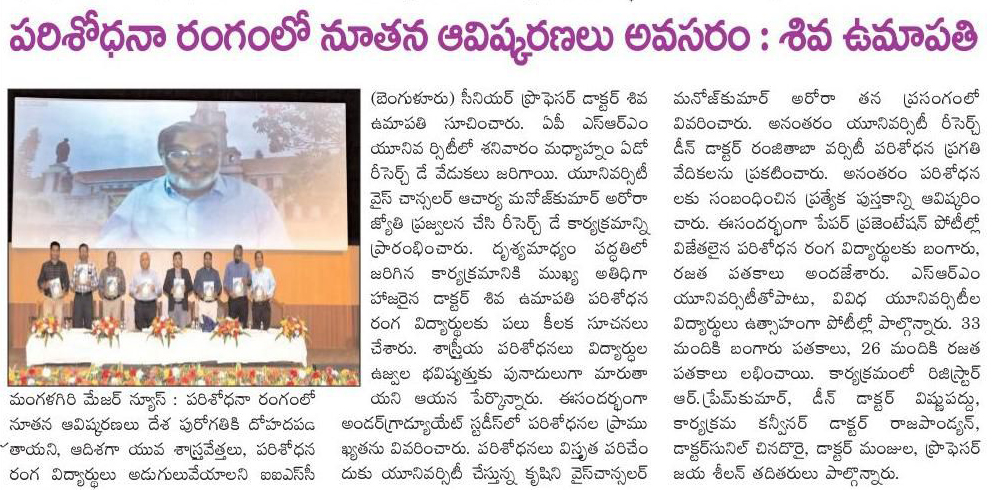
Eenadu
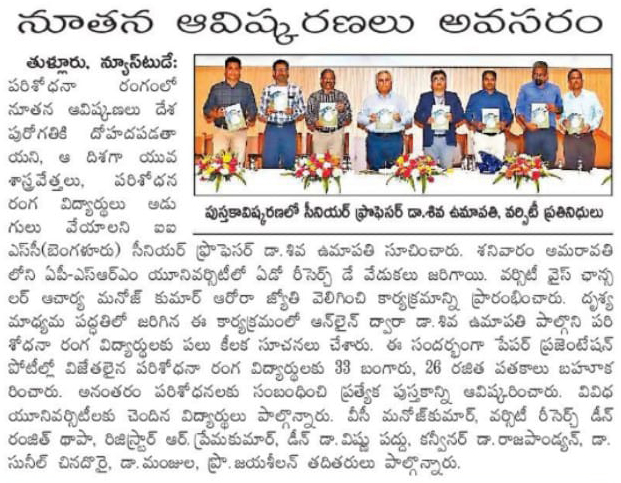
- Secularity Unveiled: A Critical Analysis by Prof. Vishnupad November 20, 2023
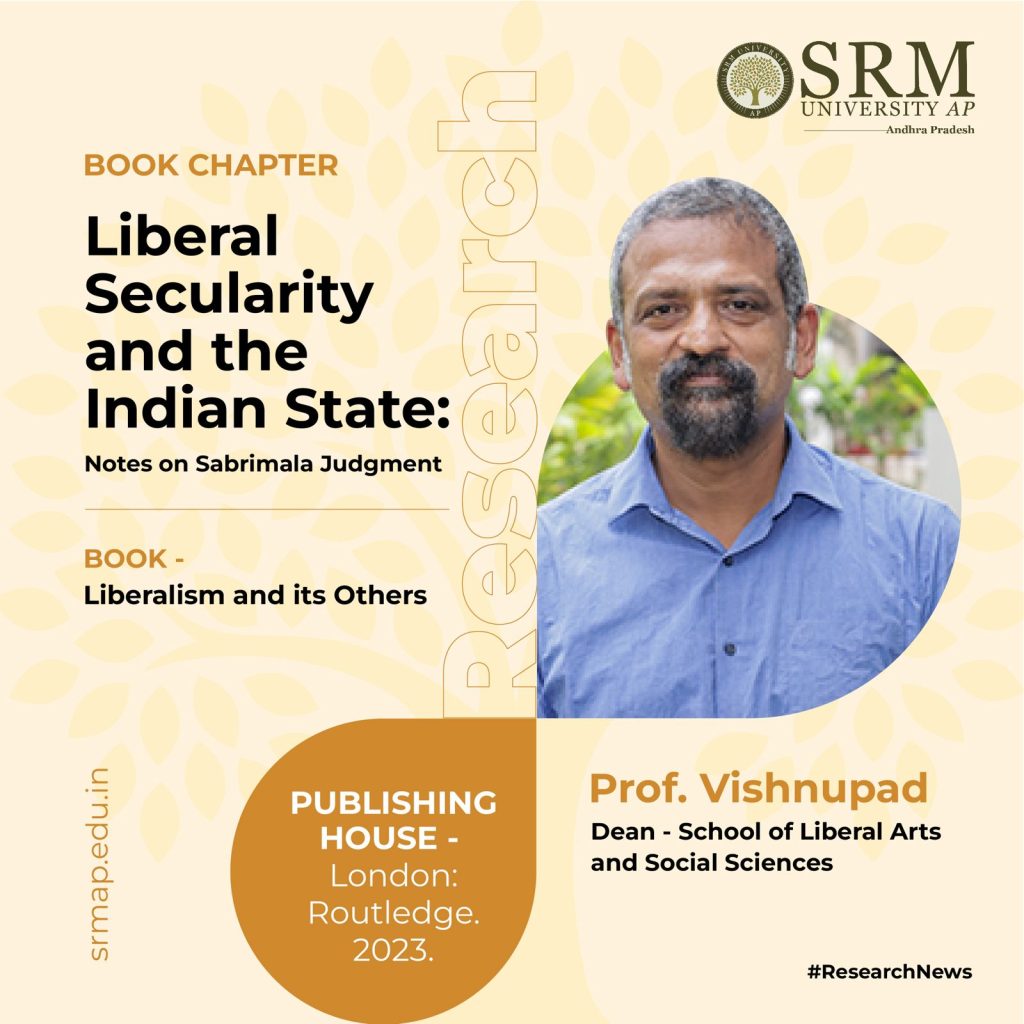
Prof. Vishnupad, Dean – Easwari School of Liberal Arts, has published his latest book chapter, “Liberal Secularity and the Indian State: Notes on the Sabrimala Judgment,” in the prestigious book “Liberalism and its Others”. The intriguing essay explores the complexities of modern secularity in liberal and postcolonial governments and navigates the delicate tango between the political and the religious. The book chapter is a scholarly investigation that maintains the importance of politics over religion while addressing the intricate dynamics of distance to closeness, neutrality to autonomy, and tolerance to publicity. Prof. Vishnupad challenges traditional knowledge, pushing to embrace ethical secularity’s dedication to discourse, transcending political and religious hierarchies.
This stimulating work is a light of intellectual engagement that will affect discussions in the fields of political philosophy, liberalism, and the state’s relationship with religion. Dive deep into these issues as we consider the nexus between politics and faith.
Continue reading → - Dr Niravkumar P Raval November 20, 2023
- Dr Basabendu Barman November 20, 2023
- Innovative Study on Microplastics in Groundwater Published November 18, 2023
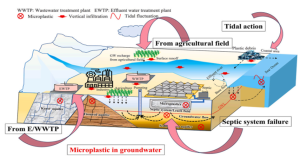 Dr Kousik Das and Dr Deep Raj, Assistant Professors in the Department of Environmental Science and Engineering (EVSE) at SRM University AP, along with Dr Uttiya Dey (Post-doc) and PhD Scholar Mr. Mijanur Mondal, have achieved a significant milestone with the publication of their research paper, “Microplastics in groundwater: An overview of source, distribution, mobility constraints and potential health impacts during the Anthropocene.
Dr Kousik Das and Dr Deep Raj, Assistant Professors in the Department of Environmental Science and Engineering (EVSE) at SRM University AP, along with Dr Uttiya Dey (Post-doc) and PhD Scholar Mr. Mijanur Mondal, have achieved a significant milestone with the publication of their research paper, “Microplastics in groundwater: An overview of source, distribution, mobility constraints and potential health impacts during the Anthropocene.This pioneering work has been published in the esteemed journal “Groundwater for Sustainable Development,” a Q1 journal with an impressive Impact Factor of 5.9. The paper offers a comprehensive overview of the sources, distribution, mobility constraints, and potential health impacts of microplastics in groundwater, contributing valuable insights to the scientific community.The research team’s dedication to advancing environmental science and addressing crucial issues such as microplastic pollution underscores SRM University AP’s commitment to impactful research and innovation.
Abstract
Microplastics (MPs) are the tiny particles of plastic of > 5 mm in diameter that have already been detected in various environmental matrices like soil, sediment, and surface water, and recently in groundwater also. The occurrence of MPs in groundwater depends up on the transportation through recharge and may controlled by source and local hydrogeology, and partly on the process of surface water-groundwater interaction (SW-GW). Groundwater recharge from agricultural stagnant water, losing streams near dumping sites and agricultural fields, effluents from wastewater treatment plants, septic system failure, etc., are the potential sources of MPs in groundwater. The factors like sea level rise and tidal pumping are among the major factors that may control the migration of MPs in coastal aquifers, along with the physical and chemical properties of the aquifer media. These MPs have another ecological concern as they can adsorb persistent organic pollutants as well as heavy metals and transfer them to animal tissues through the food chain. No such study has been done on the existence, profusion, or environmental factors that contribute to MP pollution in the groundwater in relation to the present climate change scenario. Understanding the extent of MP contamination in groundwater systems is necessary for developing effective management strategies and minimizing their impact on the environment and human health. This study focuses on the source along with the controlling factors of the migration of MPs towards groundwater, including the effect of climate change.Citation
Dey, U.,Raj, D., Mondal, M., Roy, P., Mukherjee, A., Mondal, N.K. and Das, K. (2023). Microplastics in groundwater: An overview of source, distribution, mobility constraints and potential health impacts during the Anthropocene. Groundwater for Sustainable Development. 23: 101036Practical implementation and social implications of the research
Microplastic pollution is among the recent emerging pollutants which is still understudied. n. Studies are being conducted mainly focusing the MP contamination in surface water, marine environment and soil, and very limited studies are available to address the source of MPs in groundwater. Even there is lack of standard methods for the effective detection, both qualitatively and quantitatively, of MPs. However, no such study has been done on the existence, profusion, or environmental factors that contribute to MP pollution in the groundwater in relation to the present climate change scenario. As groundwater is a major source of drinking water worldwide, it is of immense importance to enquire more about the source, transport pathways, controlling factors and human health effects of MPs for the safeguard of this valuable resource. Understanding the extent of MP contamination in groundwater systems is necessary for developing effective management strategies and minimizing their impact on the environment and human health. Our study was conducted to mainly focus on the source along with the controlling factors of the migration of MPs towards groundwater including the effect of climate change. The findings of our study would provide valuable insights into the characteristics of MPs in the environment and suggest efforts to mitigate their impact on ecosystems as well as on human health.Collaborations
The collaborators in this present study are:- Prof. Abhijit Mukherjee, Department of Geology and Geophysics & School of Environmental Science and Engineering, IIT Kharagpur, West Bengal
- Prof. Naba Kumar Mondal, Department of Environmental Science, The University of Burdwan, West Bengal
Future research plans
Microplastic is one of the recent emerging pollutants which is still understudied. The research has just started to detect MPs in different environmental media as well as to establish effective removal technologies. Our future plans with MP research are as follows:- To measure the MPs concentration in different coastal areas in India, as the oceans are the major sink for any pollutants, to obtain baseline information about the contamination load
- To detect how much amount of MPs are coming through the major rivers by linking the land use and land cover pattern so that the major sources can be detected
- Detection of MPs in the freshwater aquifer to adopt effective management strategies to safeguard the groundwater
- Development of effective and environment-friendly MP removal technologies
- Leadership Talk by Mr Satakarni Makkapati November 18, 2023
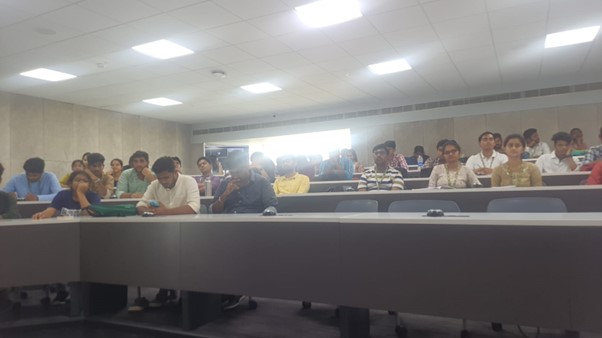
On October 12, 2023, Paari School of Business hosted a Leadership Talk by Mr Satakarni Makkapati, highlighting the critical role of effective leadership in navigating challenges and driving success. Mr Satakarni shared insights on mentorship, change management, the power of teamwork, exercising authority with care, and leading with proactivity, providing invaluable guidance for personal and professional growth.
Continue reading → - Seven Mantras of Entrepreneurship: A Talk by Mr Siddharth Tripathi November 18, 2023
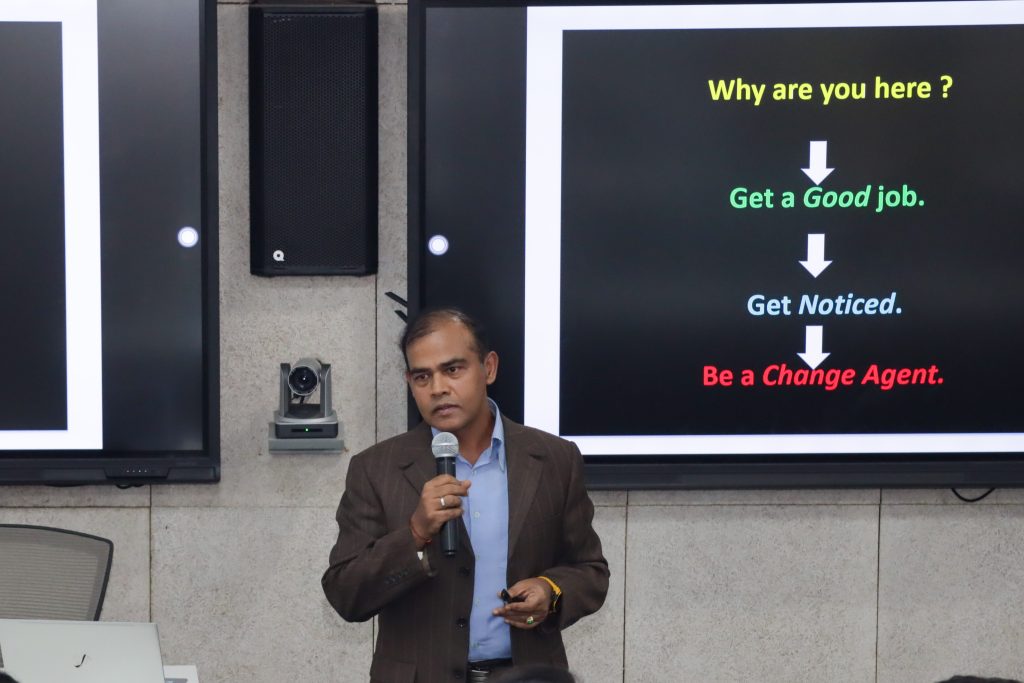
The Paari School of Business invited Mr Siddharth Tripathi, Founder and CEO of Skillizen Learning, for a Guest Talk on the “Seven Mantras of Entrepreneurship”. In the talk held on November 14, 2023, Mr Tripathi extensively discussed the key strategies and skills required to gain entrepreneurial success. He enlightened that the term ‘Entrepreneurship’ originates from the French language but derives its innermost inspiration from the Sanskrit word ‘Antah Prerna’. He enlightened the students that an entrepreneur should always have original and innovative ideas and sound domain knowledge.
During his session, Mr Tripathi stated, “The world belongs to the change agent” emphasising that young entrepreneurs must always focus on becoming change agents who can change the norms of the world. He also highlighted that there is no right strategy for successful entrepreneurship. The key to success in entrepreneurship is financial capital as well as social capital, as networking is crucial for the development of the company and critical to entrepreneurial success. Mr Tripathi encouraged budding ventures claiming that in the tortoise and rabbit race in entrepreneurship, the rabbit always wins, but the tortoise comes back with a solid stay, sharing that the fastest launcher will always be the first.
Continue reading → - MSc Environmental Science Students Shines at 7th University Challenge November 18, 2023
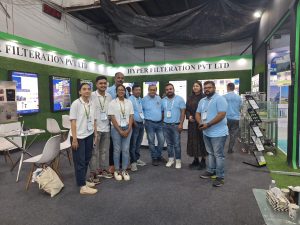
In a remarkable display of talent and dedication, three MSc Environmental Science students from the Department of Environmental Science and Engineering showcased their expertise at the 7th University Challenge, India, held on 18-19 October 2023 at the Bombay Exhibition Centre, Goregaon, Mumbai. Mr Om Banerjee, Ms Sejal Sudhir Kulkarni, and Ms Manaswini Mirthipati Subrahmanya exhibited exceptional knowledge and passion for environmental science at the event organised by the German Water and Waste Association (DWA) as a part of IFAT India 2023. IFAT- India is India’s acclaimed trade fair that showcases environmental technologies for sustainable solutions to problems in the subcontinent. The students interacted with professionals from diverse sectors, such as water, sewage, solid waste, and recycling, and explored their innovative solutions and services.
Their participation not only reflects their commitment to academic excellence but also underscores the Department’s dedication to nurturing top-tier talent in the field of environmental science. We extend our heartfelt congratulations to these students and anticipate their continued success in their academic and professional endeavors.
Continue reading →


